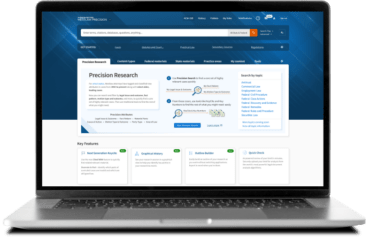Experience state-of-the-art generative artificial intelligence (AI) for legal research in Westlaw Edge Canada with CoCounsel.
AI-Assisted Research on Westlaw Edge Canada with CoCounsel is Thomson Reuters’ first generative AI-powered legal research solution developed specifically for the Canadian market. It will help legal professionals find the answers they need faster and with higher confidence.
“We’ve used AI to serve up editor-created answers for over a decade,” said Erik Lindberg, Senior Director of Westlaw Product Management at Thomson Reuters. “What’s different now is that we’re generating new responses to specific questions, rather than retrieving prewritten responses. AI-Assisted Research generates answers in real-time, reflecting current law across both federal and provincial jurisdictions. Researchers can get answers to a far broader array of questions than what is possible with human power alone.”
AI-Assisted Research uses a large language model (LLM) that analyzes the trusted content on Westlaw Edge Canada with CoCounsel to generate responses. This content includes federal and provincial caselaw, statutes, regulations, court rules, and administrative materials. The LLM also relies heavily on the editorial enhancements the Westlaw lawyer-editors add to these primary law sources, which include secondary sources, litigation materials, KeyCite, and Canadian Abridgment Classification eDigests.
“Our editors have spent nearly 150 years preparing us for generative AI,” Lindberg said. “Because of how they have structured our content and added human expertise, we can quickly and reliably generate answers to nuanced legal questions supported by authoritative search results.”
Running an AI-assisted search
The AI-Assisted Research tab will be the default homepage tab for Westlaw Edge Canada with CoCounsel, though users can easily toggle to other content tabs. Once a question is submitted, the LLM goes to work, along with the retrieval augmented generation (RAG) engine that allows users to understand how the response was generated.
First, the tool looks for applicable primary law. The content that is searched is important. Many LLMs are trained on data from a certain point in time, and the responses don’t reflect anything that happened after that point. But the law continues to evolve, and because the LLM on Westlaw Edge Canada with CoCounsel relies on current primary law, AI-Assisted Research is constantly taking in and learning from the latest and most relevant law.
Once it has selected the relevant documents, the tool generates a response. “This is incredibly powerful when you’re starting your research,” Lindberg said. “Westlaw Edge Canada with CoCounsel can tell you what the law is even if that requires information from multiple authorities.” Importantly, the response also includes footnotes so users can see the legal passages that informed the response.
Validating the response
Legal researchers can review the linked documents to validate the response. This is a tremendous time saver for users who are used to reading through multiple documents and synthesizing an answer themselves.
As with any AI-generated information, it’s still important that users read the documents to ensure the results support their position.
“Open AI tools like ChatGPT pull from all sorts of sources and sometimes serve up ‘hallucinations’ – responses that sound plausible but are completely false,” Lindberg said. “We avoid that by relying on the trusted content within Westlaw Edge Canada with CoCounsel and building in checks and balances that ensure our answers are grounded in good law.
“Westlaw Edge Canada with CoCounsel is very different from some of the freely available tools, like ChatGPT,” Lindberg continued. “Those tools try to create a chat-like experience that can be great for creative writing. But with legal research, you need accuracy, reliability, and responses that are fully grounded in trusted primary law.”
Westlaw Edge Canada with CoCounsel’s intuitive platform means users won’t have a steep learning curve to take advantage of the benefits of AI-Assisted Research. Lindberg has a tip for faster, more pointed responses: add more detail to prompts. “Historically our users are quite succinct in their natural language queries – they ask a broad question and sift through the results,” he said. “Now, they can pose a question like they would to a colleague and get a new, plain-language response. Researchers don’t have to learn how to engineer prompts; we’ve done that heavy lifting. Users may want to give Westlaw a bit more to work within their queries.”
Lindberg follows with a piece of advice that legal professionals understand intuitively: “No tool can do all of your research for you. No matter what you’re using to understand the law, be sure you’re checking the sources the results come from and using it as a starting point for your research. The real wisdom still comes from the legal professional, not the research system.”
____________________________________________________________________________________
Learn how to jumpstart legal research with faster, more complete answers using generative AI, now available on Westlaw Edge Canada with CoCounsel.










